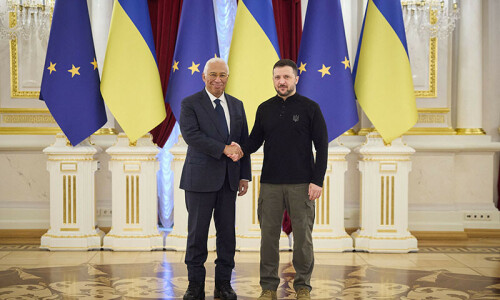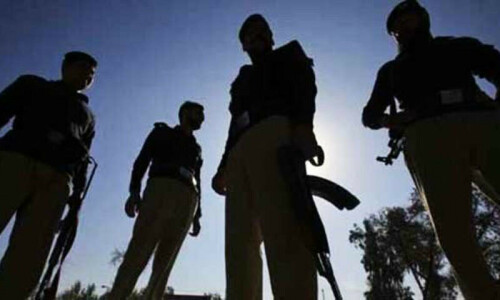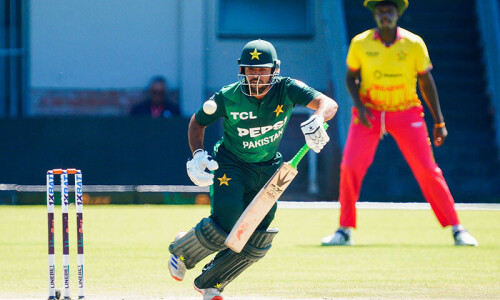THE headlines from the Nato summit that concluded a week ago in the Lithuanian capital mainly reflected the prospect of Swedish membership and, more dramatically, the failure to invite Ukraine into the fold. The petulant reaction from Volodymyr Zelensky suggested he was counting on not an immediate induction but at least some kind of timetable.
Leading figures from the British and US administrations indicated that they expected a bit more gratitude from Kyiv. There is some consternation among Western political-military elites that whenever Zelensky thanks his Western backers for their latest shipment — or promise — of lethal weaponry, he asks for more.
For obvious reasons, there was never any question of Ukraine entering the fold in the middle of a war, but there was the possibility of announcing that it would be able to join right after it ended. That, in turn, could have reduced the likelihood of Vladimir Putin agreeing under any circumstances to any kind of truce.
Mind you, the Russian president has never so much as hinted at the possibility of a ceasefire, and his imperialist impulses appear undamaged in the wake of the Wagner mutiny and the consequent impression of a weaker Kremlin. But then, the same goes for the other side.
Nato could prove more dangerous than its adversaries.
Even before Joe Biden held out the promise of cluster bombs — a particularly pernicious weapon banned by several Nato members — the response to Russia’s invasion has involved pumping weapons into Ukraine, mainly from the US but also from others. Germany advanced rapidly from helmets to tanks, and one of the less-publicised achievements of the Vilnius summit was an agreement on training Ukrainian pilots to fly F-16s.
Those warplanes are among the commitments Recep Tayyip Erdogan was seeking for his own regime, alongside Stockholm’s willingness to turn its back on the Kurds who have sought refuge in Sweden, as the price for agreeing to Swedish membership of Nato. He also wanted the resumption of talks on Turkey joining the EU, even though there is no short-term prospect of accession.
Biden has also indicated that the quality of Ukrainian democracy remains a concern, but that’s hardly bothered Nato in the past. Military coups in Turkey and Greece did not affect their status, and questions could justifiably be raised about the quality of purported democracy in countries such as Hungary and Poland, not to mention the US itself.
Following the birth of Nato in the aftermath of World War II, its first secretary general, Britain’s Lord Ismay — who was born in India, and served as military secretary to colonial viceroy Lord Willingdon — said that the military alliance was intended to keep “the Americans in, the Russians out and the Germans down”. However, as Grey Anderson and Thomas Meaney pointed out in a New York Times column, Nato “was never primarily concerned with aggregating military power”, as the divisions it fielded would never have been enough to repel a Soviet ground invasion (which, one might add, was never contemplated in Moscow). “Rather, it set out to bind western Europe to a far vaster project of a US-led world order, in which American protection served as a lever to obtain concessions on other issues, like trade and monetary policy.”
“In that mission,” they add, “it has proved remarkably successful.” There is talk now of a ‘global Nato’, and putative ‘Indo-Pacific 4’ partners — Japan, South Korea, Australia and New Zealand — were all present at Vilnius, as they were at Madrid last year. The potential adversary, in this case, is China.
No challenge to American hegemony can be tolerated, and Nato has never been much more than an instrument for that mindset, primarily in Europe — including its bombardment of the Balkans in the 1990s — but also in territories from Afghanistan to Libya. It leaves a trail of mass destruction wherever it goes, and the project of making the world safe for capitalism has not been a particular success outside Europe.
None of the above is intended to suggest that Russia or China is on the right track. The monumental folly of invading Ukraine will haunt Russia long after Putin perishes, by natural causes or otherwise, and Xi Jinping’s ‘Chinese dream’ could turn out to be a nightmare for plenty of less powerful nations, but also for China itself. Yet the prospect of entrenching US neo-imperialism more widely is much like adding fossil fuel to the fire while the world experiences some of its hottest days in thousands of years.
Anthropogenic climate change has brought humanity to the brink of self-annihilation. Egged on by the masters of war — excoriated by Bob Dylan 60 years ago shortly after Dwight Eisenhower’s warning against the military-industrial complex, which remains dedicated to profiting from the economies of conflict — misanthropic militarism could push us over the cliff.
Published in Dawn, July 19th, 2023











































Dear visitor, the comments section is undergoing an overhaul and will return soon.